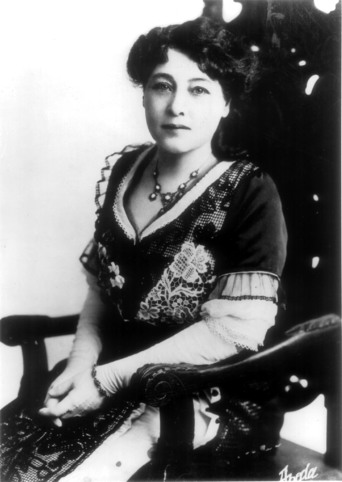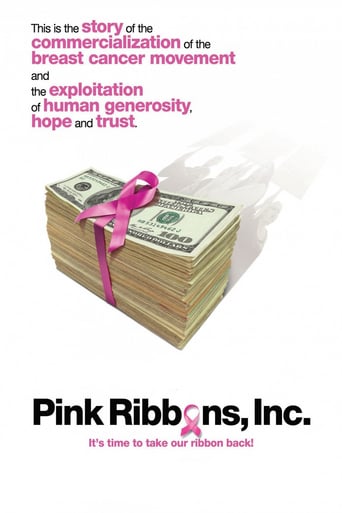


Pink Ribbons, Inc.
Breast cancer has become the poster child of corporate cause-related marketing campaigns. Countless women and men walk, bike, climb and shop for the cure. Each year, millions of dollars are raised in the name of breast cancer, but where does this money go and what does it actually achieve? Pink Ribbons, Inc. is a feature documentary that shows how the devastating reality of breast cancer, which marketing experts have labeled a "dream cause," becomes obfuscated by a shiny, pink story of success.
-
- Cast:


Similar titles

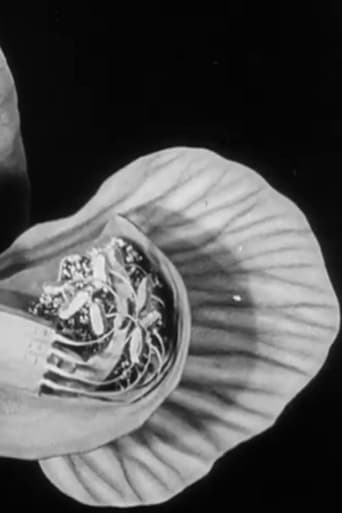
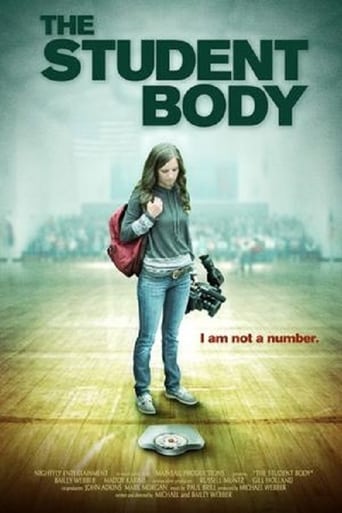
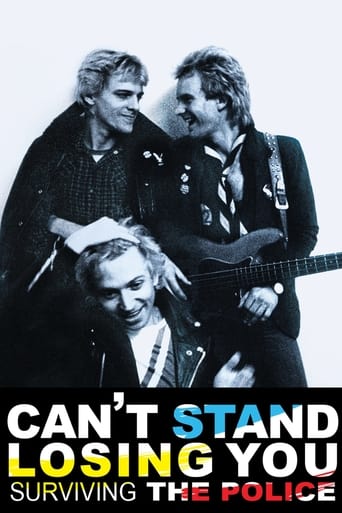
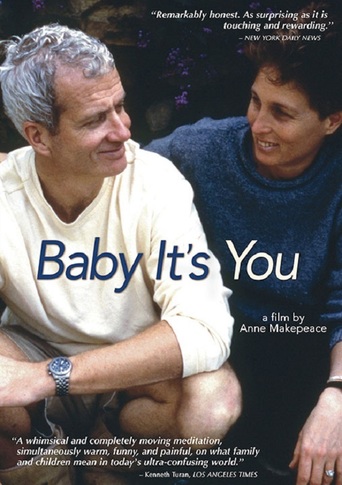


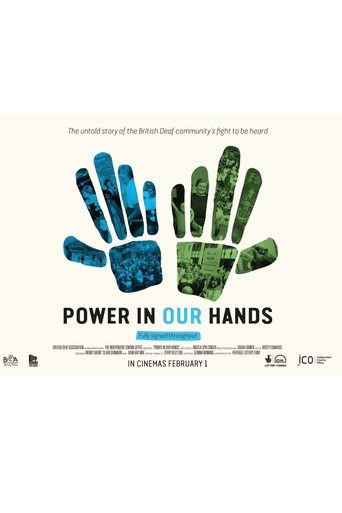
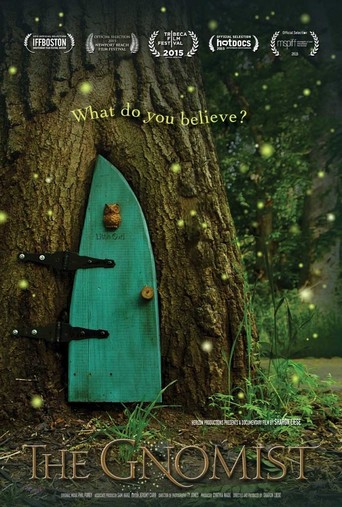
Reviews
Good start, but then it gets ruined
everything you have heard about this movie is true.
There are moments that feel comical, some horrific, and some downright inspiring but the tonal shifts hardly matter as the end results come to a film that's perfect for this time.
This is one of the best movies I’ve seen in a very long time. You have to go and see this on the big screen.
I went shopping at a local supermarket today, bought roughly forty items, and three of them bare a pink box supporting some breast cancer awareness fund. When does the ambition of creating awareness simply become lucrative glamorization? I hear more about walks, runs, jumps, and efforts to promote charities raising money to donate to a breast cancer organization, but scarcely hear about advances in science, technology, or medicines to try and prevent the disease. Is our money being put to use or is it put to fund another gimmicky public charity? Breast cancer is the leading cause of death of women in America, and cancer in itself is one of the most common diseases among both sexes. I know for a fact I'm personally at risk of developing prostate cancer because of the checkered history in my family. I've long thought if companies really would love to find a cure for cancer, or would that cease in the immense profits that charities continue to turn in? Recently, I watched a documentary on the pitifully disappointing American healthcare system called Escape Fire: The Fight to Rescue American Healthcare. A rare documentary, seemingly lacking a specific political bias, the film featured a female subject that bluntly stated that it's almost as if the system doesn't want you die or get better, but just keep coming back and handing money over the counter.Pink Ribbons, Inc., based on the 2006 novel by Dr. Samantha King, professor of kinesiology and health studies at Queen's University, explores the possibility and the stunning proposition that the "pink ribbon campaign," whose efforts are directed specifically at creating breast cancer awareness, is only a shameless cash-grab for companies to utilize while contributing very little of their profits to famous organizations. Some companies products that are donating towards breast cancer research include chemicals that possibly contribute higher risk of developing the disease. Not to mention, with so many organizations, big and small, and so many corporations shelling out products apparently with profits being donated to cancer research, it results in very disorganized money patterns. Millions being donated, with little rhyme or reason, and little coming out that is revolutionary.There comes a point where we can seemingly define the sincerity of companies attempting to fund breast cancer research and some simply trying to bank off a serious disease. When Susan G. Komen and Avon commit to holding a charity event, you almost feel compelled to trust them because they've given millions upon millions of dollars in efforts to find cures. But when we begin seeing pink handguns, we question how we've drifted from sincerity to shallow consumerism. I've frequently seen teenagers walk around with thick bracelets proclaiming "I LOVE BOOBIES. KEEP A BREAST." Do they wear them because they believe in stopping breast cancer, or do they just love having something as provocative as "BOOBIES" on their wrist? The same can go for those brazen "Cancer Sucks" t-shirts. Why? Interviews conducted are with the author of the Pink Ribbons, Inc. novel Samantha King, Barbara Eherenreich, writer of many books around the cancer, who resents the idea of softening the disease into making it "normal and feminine," and my personal favorite, the sassy, shamelessly blunt Barbara Brenner, a health activist, diagnosed twice, and not afraid to attack some corporations' lucrative practices. She makes no hesitation to call out Yoplait Yogurt for their "Save Lids to Save Lives" campaign, where if one were to peel off a lid of their yogurt, clean it up, then mail it back to the company, a dime would be donated to the Susan G. Komen Foundations. Brenner states that if you were to eat three cans of yogurt, everyday, and send the lid back for four months straight, the time the event was going on that, you'd successfully donate only $34 to the Komen foundation. "Bottom line, write a check," she says.Easily, the most intimate shot of the picture involves an obese African-American woman who struggles to walk at one of the sponsored breast cancer walks. We are unaware if she's diagnosed with the disease, knows someone who is, or simply walks out of the goodness of her heart. For about thirty seconds, we watch as she pursues on, through sweat and exhaustion; something about that scene made me want to help her along or sit her down and give her the resources necessary to complete the walk. It is one of the most affecting shots in any documentary I've seen, mainly because of the impressionistic prints it leaves on the viewer.The speakers we see in the film are mostly women, understandably so. One thing I caught early on that, beneath their deep intelligence and their wide range of talents, lied an angry, seemingly bitter core, in someways throwing the documentary a curveball. These women are mainly angry at the glorification of a painful disease that deteriorates the energy and body of a woman, but it seems they occasionally talk down to those who participate in walks and runs for the charitable organizations of the disease when they appear to be doing nothing but trying to take part in a community event to raise money or simply partake in the activities to memorialize a loved-one. It seems unfair to pull the "you don't understand suffering" card to those who are benefiting those who are actually suffering, don't you think? Starring: Barbara Brenner, Barbara Enherenreich, and Samantha King. Directed by: Léa Pool.
"Pink Ribbons, Inc." is a far from perfect film but it's also a film that dares to ask many important questions. While the masses blindly buy their pink ribboned products and corporations thereby get richer, this film dares to question many things about this trendy cause. Because it will get you to think, it's well worth seeing. Some of the wonderful questions they pose include: There are some odd associations--such as many of the companies sticking the ribbons on their products ALSO produce carcinogenic products--such as cosmetics.The percentage of the money from these ribbons that goes to research is negligible. Most folks buying the products and doing the cancer walks assume the bulk of the money is being used for research when it isn't.Throwing money blindly at a problem may be a complete waste. There is no coordination among researchers and there is an assumption that money will lead to an elimination of the problem--providing a false sense of control.There also were some parts in the film that irritated me. Either statements were made that were OPINION instead of fact-based bothered me and many important points were never mentioned. These include: The link between chemicals and cancers needs to be addressed. Research establishing links between product exposure and cancer have not been done on many items we use all the time. This was a great point but also problematic and something I disliked about the film. They never even discussed how many (if not most) cancers may be caused by genetics and a few of the people interviewed seemed to ASSUME certain chemicals are leading to higher incidence of cancer. No one mentions that PERHAPS the increase in cancer is simply because people are living much longer and the longer you live, the more likely you'll get cancer.Oddly, no one in the film talked about how all the attention and money focused on breast cancer may lead to deaths--deaths because less attention and money is being spent on research on OTHER cancers and non-cancerous killers.One lady asserted that cancer MAY be caused by viruses but, as I said above, the genetic link was NEVER mentioned in the film. This is VERY odd, as the link of genetics with breast cancer is very strong (i.e., it is often passed from generation to generation within families).So, overall, I'd say the film is a mixed bag. I admire them for taking on a 'sacred cow' but also wish the film had maintained a much tighter focus--in other words, WHERE IS ALL THIS MONEY GOING? and DOES ANY OF THIS REALLY HELP? Worth seeing but don't think the film is Gospel, either.
I was very eager to see this movie. I am a skeptic by nature and the barrage of pink the last few years has had me wondering. This movie has an agenda. The film wants to be the black in the pink parade. That is OK. A valid point the film makes is that corporate America is making money on the "pink". Solid points are KFC making profits off selling dubious food under the "pink" banner. Estee Lauder selling cosmetics that may contain cancer causing ingredients under the "pink" logos. The NFL trying to refurbish their image with "pink" everything in October. Clearly most businesses involved have self serving motivations. I was happy to see that brought out. They had some stage 4 cancer patients express their displeasure with the happy joyful pink parade. I sure respect the opinion of the ladies but I suspect their are an equal number of cancer patients that appreciate the attention of the pink awareness. We were not shown many differing opinions.The film makes some great points about working on prevention instead of the phantom cure which may or may not come. This was a solid idea that should have been more fleshed out.Where the film fails is making the environmental connection. It ventures into kooky junk science territory a bit here. They implied Ford should not be involved with breast cancer awareness because they make cars and cars pollute. OK.We get to the end of the film and we are off the rails a bit now. We have to blame President Bush for "using" breast cancer awareness for his mid east policies advancement. (They must have missed Obama's use of breast cancer awareness 2009-2011) The movie was made in 2011.Overall it is a bit of a mess in a cinematic sense. It is sort of hard to watch. It doesn't flow well. The people in the film all seemed a touch angry or just professional activists.The film also seemed angry at the many and mostly good people trying to help other people and fight this horrible disease. I find it hard to fault people trying to raise money to help others in our communities even if the "pink" charities may have jumped the shark so to speak.A great subject that is not popular to talk about. Too bad it wasn't done by competent people.
While I don't agree with some of the main points made by the documentary, I appreciate the film's honesty in discussing the corporate culture that has become pervasive in breast cancer fund-raising. I find it bizarre that there is this culture in the US that seems to think that throwing money at a cause with inevitably lead to solutions. The film makes a great point about holding the health and research industry more accountable. People are pouring money down the drain funding basic science research and incorrect mouse models that will never be translated into treatments for human beings. They are supporting monolithic institutions like the research and health care industries that have their own self-interests at heart. Researchers and medical professionals make their livelihood off of this funding. The majority of them don't have any real interest in finding a cure when they can milk the cash cow for their own benefit for years.

